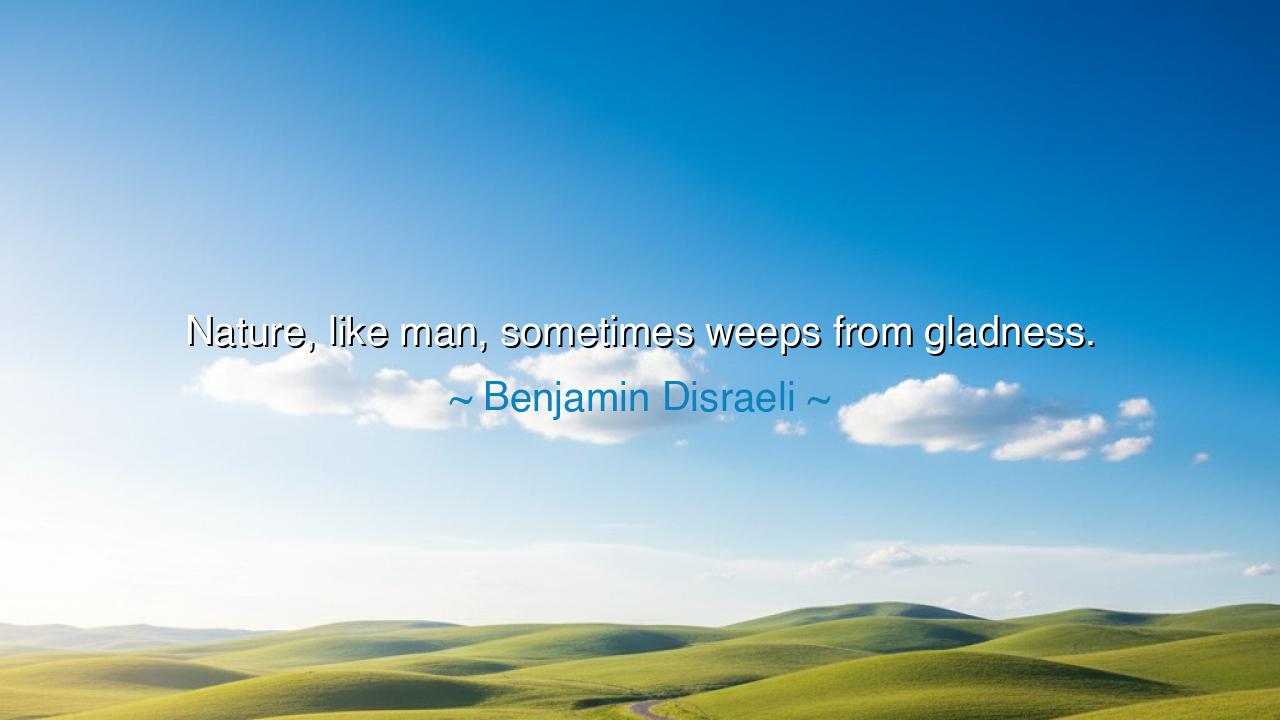
Nature, like man, sometimes weeps from gladness.






"Nature, like man, sometimes weeps from gladness." Thus spoke Benjamin Disraeli, the British statesman, whose words remind us that the language of the earth and the language of the soul are not separate but one. In this brief sentence lies a profound truth: that nature feels as man feels, that its storms and rains, its thunder and tears, may not always be signs of sorrow, but sometimes the overflowing of joy too deep for silence. Just as man’s heart breaks into tears when it can no longer contain its gladness, so does the earth shed rain not only in grief, but in celebration of life renewed.
The ancients knew this well. They looked upon the skies and rivers not as lifeless things, but as living presences, kin to the human spirit. They saw in the sudden rain upon the fields not a curse, but a blessing—the weeping of nature that brings forth grain and fruit. To them, the storm could be a song of wrath, but also a hymn of joy. Disraeli’s words echo this ancient wisdom: that just as our tears may spring not only from pain but from gratitude and delight, so too does nature’s weeping often conceal within it gladness.
Consider the story of the farmer who labors long in drought. Day after day the soil cracks, and the crops wither. Then, when the long-awaited clouds gather and the first drops fall upon the parched earth, he lifts his face to the heavens and weeps. In that moment, man and nature weep together—the skies with rain, the farmer with tears. Both weep not in sorrow, but in gladness, for life has returned. Such is the mystery of the world: that joy, when too great, must overflow as tears, whether from the heart of man or from the clouds above.
History, too, gives us examples of this sacred union. When the Second World War ended, cities across Europe saw parades, dances, and laughter—but also faces wet with tears. Men and women wept as they embraced each other, not from grief, but from relief and the overpowering joy of peace. And as if in harmony with human hearts, the skies over London that summer poured down rain upon the crowds. Witnesses wrote of a strange sense that the heavens themselves shared in mankind’s gladness, as if nature wept with the people, tears mingling in a common song of triumph.
Disraeli’s words also carry a deeper teaching: that tears are not a sign of weakness, but of fullness. Whether in man or in nature, they reveal a heart too overflowing to remain still. A soul that never weeps is a soul that has not yet felt life’s depths; a land that never knows rain is a land that cannot bear fruit. Thus, the tears of joy, whether of the sky or the human eye, are sacred offerings of abundance. They are signs that something greater than words has touched us, and only in water can it be expressed.
The lesson for us is clear: do not be ashamed of your tears when they spring from joy. For just as the earth’s rains bring renewal, your tears may cleanse your heart and water the seeds of gratitude within you. When life overwhelms you with beauty—a child’s laughter, a long-awaited reunion, the sudden kindness of a stranger—let your tears fall freely, and know that you are in harmony with the ancient rhythm of the world.
Practically, this means living with openness: notice when the weeping of nature blesses you, in the rain upon the earth, in the streams that swell after snow, in the dew upon the morning grass. Let these remind you of life’s abundance. And when your own heart overflows, do not harden it. Allow your tears to fall, not as shame, but as testimony that you, too, are alive, you, too, are part of the great cycle of earth and sky.
So pass this teaching to your children: that the tears of both man and nature are not always sorrow, but often joy made visible. And when they ask why the skies sometimes rain on days of celebration, you may tell them: “Because even the heavens, like man, sometimes weep from gladness.”






AAdministratorAdministrator
Welcome, honored guests. Please leave a comment, we will respond soon